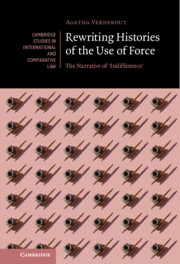Book contents
- Rewriting Histories of the Use of Force
- Cambridge Studies in International and Comparative Law: 160
- Rewriting Histories of the Use of Force
- Copyright page
- Contents
- Foreword
- Acknowledgements
- Abbreviations
- Introduction
- Part I The Use of Force in Nineteenth-Century Doctrine
- Part II The Use of Force in Nineteenth-Century Practice
- 5 Justifying the Use of Force in the ‘Centre’
- 6 Justifying the Use of Force in the ‘Semi-peripheries’
- 7 Justifying the Use of Force in the ‘Peripheries’
- Conclusion of Part II
- Part III The Narrative of Indifference in the Twentieth Century
- Conclusion
- Bibliography
- Index
- Cambridge Studies in International and Comparative Law
6 - Justifying the Use of Force in the ‘Semi-peripheries’
from Part II - The Use of Force in Nineteenth-Century Practice
Published online by Cambridge University Press: 10 September 2021
- Rewriting Histories of the Use of Force
- Cambridge Studies in International and Comparative Law: 160
- Rewriting Histories of the Use of Force
- Copyright page
- Contents
- Foreword
- Acknowledgements
- Abbreviations
- Introduction
- Part I The Use of Force in Nineteenth-Century Doctrine
- Part II The Use of Force in Nineteenth-Century Practice
- 5 Justifying the Use of Force in the ‘Centre’
- 6 Justifying the Use of Force in the ‘Semi-peripheries’
- 7 Justifying the Use of Force in the ‘Peripheries’
- Conclusion of Part II
- Part III The Narrative of Indifference in the Twentieth Century
- Conclusion
- Bibliography
- Index
- Cambridge Studies in International and Comparative Law
Summary
This chapter turns to the analysis of the practice of justifying force in the ‘semi-peripheries’, i.e., in non-‘European’ States. The purpose is to see whether legal arguments were also developed and whether they differed from the ones brought forth to justify bellicose endeavours in the ‘centre’. It focuses on four case studies: the European intervention during the Greek War of Independence (1827); the French expedition in Lebanon and Syria (1860); the western intervention during the Boxer Revolt in China (1901); the Monroe doctrine and the Roosevelt corollary with special attention to their application in Nicaragua in the early twentieth century (1909–1912). It argues that, although these interventions rarely gave rise to full-blown wars, the justifications brought forward did not substantially differ from the ones used in the ‘centre’. States, in fact, carefully developed legal arguments and evidenced how their actions were meant to redress a previous offence.
Keywords
- Type
- Chapter
- Information
- Rewriting Histories of the Use of ForceThe Narrative of ‘Indifference', pp. 150 - 177Publisher: Cambridge University PressPrint publication year: 2021

